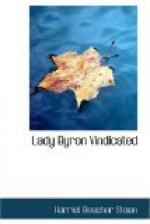Of the extent to which this autobiography was circulated we have the following testimony of Shelton Mackenzie, in notes to ‘The Noctes’ of June 1824.
In ‘The Noctes’ Odoherty says:—
’The fact is, the work had
been copied for the private reading of a
great lady in Florence.’
The note says:—
’The great lady in Florence, for whose private reading Byron’s autobiography was copied, was the Countess of Westmoreland. . . . Lady Blessington had the autobiography in her possession for weeks, and confessed to having copied every line of it. Moore remonstrated, and she committed her copy to the flames, but did not tell him that her sister, Mrs. Home Purvis, now Viscountess of Canterbury, had also made a copy! . . . From the quantity of copy I have seen,—and others were more in the way of falling in with it than myself,—I surmise that at least half a dozen copies were made, and of these five are now in existence. Some particular parts, such as the marriage and separation, were copied separately; but I think there cannot be less than five full copies yet to be found.’
This was written after the original autobiography was burned.
We may see the zeal and enthusiasm of the Byron party,—copying seventy-eight folio sheets, as of old Christians copied the Gospels. How widely, fully, and thoroughly, thus, by this secret process, was society saturated with Byron’s own versions of the story that related to himself and wife! Against her there was only the complaint of an absolute silence. She put forth no statements, no documents; had no party, sealed the lips of her counsel, and even of her servants; yet she could not but have known, from time to time, how thoroughly and strongly this web of mingled truth and lies was being meshed around her steps.
From the time that Byron first saw the importance of securing Wilson on his side, and wrote to have his partisans attend to him, we may date an entire revolution in the ‘Blackwood.’ It became Byron’s warmest supporter,—is to this day the bitterest accuser of his wife.
Why was this wonderful silence? It appears by Dr. Lushington’s statements, that, when Lady Byron did speak, she had a story to tell that powerfully affected both him and Romilly,—a story supported by evidence on which they were willing to have gone to public trial. Supposing, now, she had imitated Lord Byron’s example, and, avoiding public trial, had put her story into private circulation; as he sent ‘Don Juan’ to fifty confidential friends, suppose she had sent a written statement of her story to fifty judges as intelligent as the two that had heard it; or suppose she had confronted his autobiography with her own,—what would have been the result?
The first result might have been Mrs. Leigh’s utter ruin. The world may finally forgive the man of genius anything; but for a woman there is no mercy and no redemption.




